Debate Keeps
Turning Back
To Main Street
2 Democrats, GOP Challenger
Joust As 3/18 Elections Near
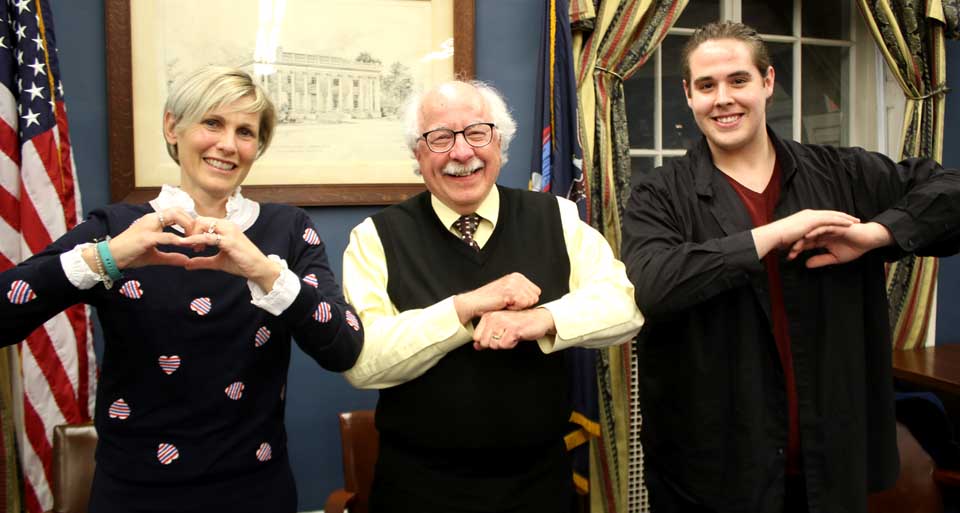
By JIM KEVLIN • Special to www.AllOTSEGO.com
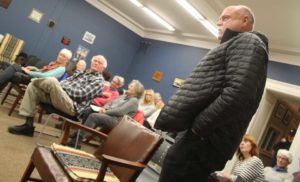
COOPERSTOWN – It was the bluntest opinion of this evening, on what to do about the former CVS at 100 Main St., the downtown centerpiece now vacant for three years.
“They never should have allowed CVS to leave Main Street,” declared village trustee candidate Mary Margaret Robbins Sohns in response to a question from Jay Bosley, a Hartwick resident who owns property in the village.
The venue was a League of Women Voters’ issue-focused debate in the Village Board meeting room, where Republican challenger Robbins faced two incumbents, Democratic trustees MacGuire Benton and Joe Membrino. League co-president Liane Hirabayashi moderated.
Voting is noon-9 p.m Wednesday, March 18, at the fire hall.
A former pharmacist at CVS, Robbins recalled how the former drug store had been “a gathering place” for village folk – in particular, “in aisle 8.”
Membrino, a lawyer who retired her in 2013, said the asking price, $1.4 million, is too high. “Think about that for a second: Who’s going to spend that and have a vision.”
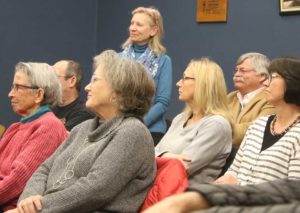
While it’s hard to figure out how to get there, he said he sees the building as divided in half, an arcade going down the middle accessing first-floor stores, apartments above and parking in the basement.
But, “where is the money?” he asked. Market forces are working against the redevelopment, he said.
Benton, Otsego County deputy elections commissioner, agreed, “it’s overpriced.” He said his vision is similar to Membrino’s, with lower rents attracting “budding entrepreneurs.” But, he added, “the Village of Cooperstown isn’t into real estate.”
The evening – introductory remarks, followed by questions from 30 people in the audience – covered a range of topics, with each candidate answering first sequentially. Here’s a sampling:
- PREPARING FOR CORONAVIRUS, from Mary Marx:
Membrino and Benton expressed confidence in Bassett Hospital rising to the challenge.
Robbins, a heart-transplant recipient, said, “I’ve been battling this issue for two years. I can’t offer policy but I can offer advice” – use hand sanitizer, don’t use refillable mugs, avoid refillable bags. “There’s nothing worse than fear itself,” she said.
- RETURNING TO A NON-POLITICAL “UNITY TICKET” IN VILLAGE ELECTIONS, from Roger MacMillan, with a follow-up by Richard Sternberg.
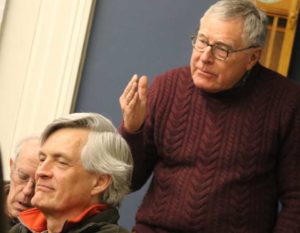
Both Democrats said they support a non-partisan approach to village government. But Membrino added, “I’m a supporter of two parties. Parties are formed around ideas and ideals.”
Benton agreed, saying he’s looking for a government based on “transparency and inclusion,” and favors a village primary instead of a caucus to get more people involved.
Robbins said “we need to come together and work together,” but that hasn’t always been the case: Other Republicans might have been better candidates than she, but didn’t run “because of what’s happened in the past,” a reference to past partisan strife.
- WHAT WAS EACH INCUMBENT’S PROUDEST ACCOMPLISHMENT, from Hudi Podolsky, Bosley’s spouse.
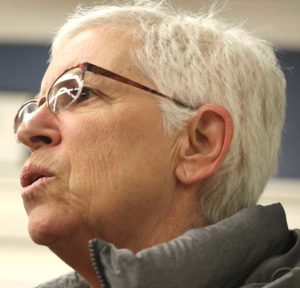
Membrino cited his role on the ad hoc housing committee that has paved the way for apartment houses and more houses with apartments. He called CCS basketball “the repository of what Cooperstown is,” adding “housing is essential to rebuilding Cooperstown. It’s all of a piece.”
Benton said, “We need a diversified housing stock.” There are apartments, but “a lot of them aren’t affordable.”
Robbins called the 2019 run up to the state championship, which she monitored from her hospital bed, “magical,” agreeing with Membrino. Still, she said, “there’s no longer an anchor for Main Street. That says a lot of what’s going on in our community.”
- WHAT’S YOUR VIEW ON CLIMATE CHANGE, from Dorothy Hudson.
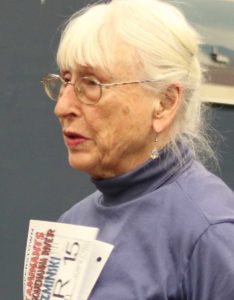
To her, said Robbins, climate change is Lyme disease – which, untreated, led to her transplant – and its continuing virulence. Climate change, she said, created more deer, more vegetation and more ticks. “It’s our job to be mindful of change,” she said.
Membrino said, “I do believe it’s substantial.” Benton called it “the greatest existential threat we face as a nation; I am obligated to fight back.” He wants to ensure village funds are “100 percent” divested of fossil fuel stocks.
- CAN VILLAGE RESIDENTS GET A BREAK ON SUMMER PARKING PERMITS, AS HAPPENS AT THE BOAT DOCKS, from Bill Waller.
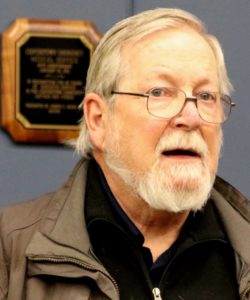
Better, MacGuire said, would be “increasing it for out-of-town residents. We get a lot done because we have the financial base to do that.”
Robbins said, “I was very much against” paid parking. “They said it would stop people from parking downtown, from shopping downtown. I don’t know if that occurred; I know what happened downtown.”
“The boat dock is a luxury,” said Membrino. “Driving into Cooperstown is more of a necessity.” And $450,000 a year, “most from out-of-towners … helps us set the table for the visitors.”
- WHY DOES THE MINI-PLOW THAT DIGS OUT HYDRANTS AND CORNERS DOWNTOWN THEN GO RIGHT DOWN THE MIDDLE OF MAIN STREET, AVOIDING PLOWING SIDEWALKS, from Milo Stewart.
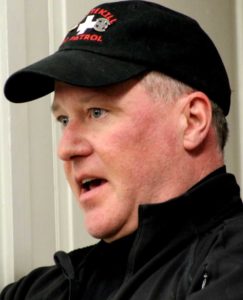
Membrino wasn’t sure, but said “everything we do is for the residents.”
Benton said there needs to be “a level of personal responsibility” in sidewalk clearing.
“If we’re going to burn the gas,” said Robbins, “we might as well burn it for the people.” Other county villages do plow sidewalks – and collect household garbage, she said: “If we could do it, we should do it.”
The next questions, from Dave Pearlman and Glenn Hubbell, extended the discussion of the downtown.
“Main Street is where people meet,” said Robbins. “That’s why we call it Main Street. In 20 years, we may have to call it something else.”
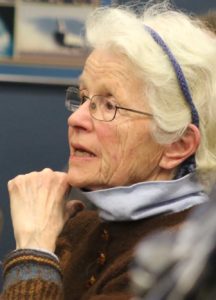
With the $5 million renovation of Doubleday Field, and $8 million worth of downtown renovations, the village is “sprinting into the future,” aided by “smart fiscal management,” said Benton.
Robbins said, “Where are the services for the people? We break our backs in the summer. When do we get it back?”
Mary Marx, who also is a vendor at the Cooperstown Farmers’ Market, pointed out that on Hall of Fame Weekend, Pioneer Alley is closed off and, for the past two Inductions, the market’s had to close. She asked, “Can you help us with this?”
Membrino said it’s “a tough problem. The barriers are up for crowd control. There are also layers of security far beyond our jurisdiction.”
Benton said he’s a “big supporter” of the farmers’ market, but “some things just aren’t feasible.”
Robbins said, “I love ideas. Main Street is cleared off. There’s a huge space in the middle of Main Street. The farmers’ market would be amazing in the middle of Main Street.”


What on earth does this mean ? “They never should have allowed CVS to leave Main Street.” Who is they ? The Village ? How could a municipality stop a local business from re-locating elsewhere in the town ?
Just think of the liability to the Village, ultimately paid for by its taxpayers, if the Board of Trustees tried to force CVS to stay on Main Street.
How exactly were we going to do that? Denying them permission to build would not have kept the Main Street store open. CVS made that clear. Denying them the permit to build the new store would have been treating CVS with prejudice in comparison with other businesses that may have wanted the site to build (which as one may remember was a burned out motel and a potential magnet for illegal activity). This would have opened the Village up to a difficult to defend lawsuit. That CVS stayed in the Village at all was a distinct positive to our citizens and the Village as a whole.
It is so easy to criticize when one doesn’t have any responsibility for the issue or apparently understanding of the intricacies of the problem.
As to another question, why can’t the village clear snow/ice from sidewalks the answer is actually quite simple. Of course we can but are the citizenry and property owners willing to see taxes increase to cover this. It is not so simple as calling in people exactly when and only when you need them. There are about 22 miles of sidewalks in the Village. To get that much cleared in under 24 hours post snow fall would require a whole troop of people and equipment all available at one time. Could it be done, maybe, but at a very high price. Should we hire more full time staff in order to have extra people available at infrequent times? in my opinion this is a very bad idea.
Finally I will comment on the idea of a fusion ticket for village offices. As I asked at the debate, “Who will pick the ticket?” I was quite pleased to see that Bill Waller, as staunch a Republican as I am a Democrat, say essentially exactly the same thing as I did. When you have deals being made there is no real democracy and in fact a very small minority gets to control local political life for a long time. It’s messy but the party system augmented by the ability for anyone to run who can get 50 signatures on a petitions is in truth the fairest, least open to corruption system available.
~ Richard J. Sternberg, M.D., Trustee, Village of Cooperstown